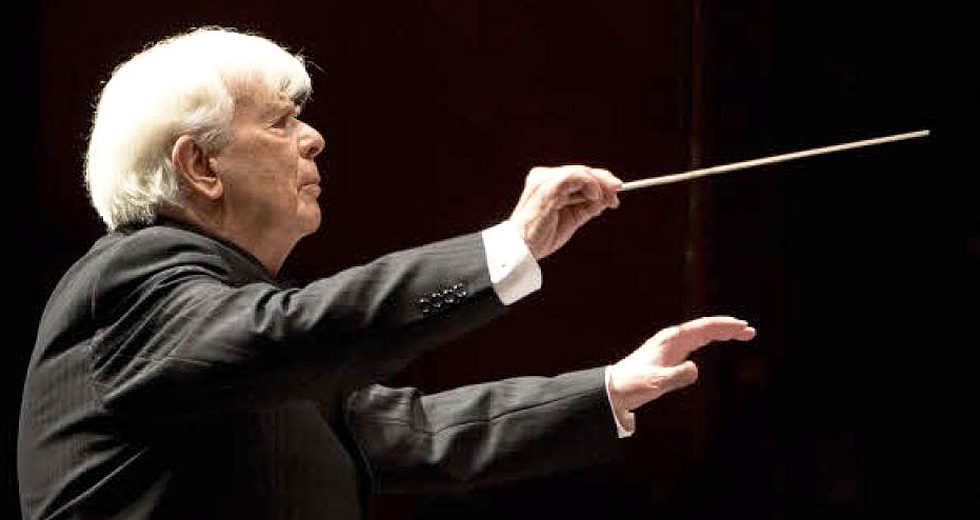
Christoph von Dohnányi would seem to have nothing left to prove. After serving as music director of the famed Cleveland Orchestra from 1984 through 2002 and holding an array of other important posts, he stands as one of the indisputable deans of the international conducting world. But that does not mean he is resting on his laurels. Far from it. Indeed, he maintains a busy schedule, which this season included a European tour with London’s Philharmonia, an orchestra for which he’s honorary conductor for life.
“Nowadays, I can travel a little bit more and pick what I want to do with the orchestras I really like very much, and they like me,” said Dohnányi said from his home in Door County, Wis. “Then, I do my work and enjoy it.”
Now 86, the German maestro returns to the Chicago Symphony Orchestra for concerts June 9-11, in a program dedicated to the music of Mozart and Beethoven. Audiences then will have another chance to hear Dohnányi in action when he is back in April 2017 for a program featuring Beethoven’s Symphony No. 6. (Edo de Waart steps in for Dohnányi in CSO concerts June 2-7, after the German maestro had to delay his arrival due to recovery from minor eye surgery.)
“Every time you meet great pieces, they should approach you as newcomers,” he said. “That’s what has happened to me and still does happen to me. I’m doing repertoire now that is not too limited but more limited than it used to be, and that’s OK because there are some pieces where you really feel that they will always be greater than you understand.”
When asked about his proudest moments during his much-praised tenure with the Cleveland Orchestra, he demurred. Instead, he mentioned he was a “little bit proud” of putting a bigger emphasis on the dramatic side of opera when he was general music director of the Frankfurt Opera. He took over in the position in 1968, succeeding Georg Solti, and remaining until 1977, when he became intendant and chief conductor with the Hamburg State Opera. “We started to look at opera more from the theater point of view, which has actually sometimes led into some crazy stuff that I don’t support — nonsense, really,” he said. “But to break up the very stubborn and solid walls around opera as far as theater was concerned for a long, long time, and there the Frankfurt Opera in my days was one of the leading opera houses.”
Though Dohnányi concedes that some smaller orchestras are struggling, he is not worried about the future of the so-called Big Five orchestras in the United States, which includes the CSO and Cleveland Orchestra. “Cleveland is a very special case, because it’s a rather small city with many problems,” he said. “That’s why there is a lot of pressure on this orchestra to be really excellent. He remains optimistic about orchestras and the classical world in general, because of the quality of the music they represent. “As long as we have the scores of Mr. Mozart,” he said, “we will perform him somewhere.”
But he does believe that the classical world needs to work harder to connect with contemporary culture. “The real problem is the distance that has developed between so-called contemporary music and the public,” he said. “I don’t see a problem with the orchestras. I see a problem that the creative side up to now has not gotten to the point that the public is eager to listen to what’s being done now.” It is in the field of popular music or what he called “entertaining music” that the new dominates, in part, he said because of its embrace of three qualities that used to drive classical music: improvisation, experimentation and the spirit of ensemble.
His concerts June 9-11 open with Mozart’s Symphony No. 25, continue with Beethoven’s Piano Concerto No. 2 and end with Mozart’s Symphony No. 41, (Jupiter). “If someone asks whether you’d like to do the Jupiter Symphony, why shouldn’t you?” Dohnányi said. “I did it in Boston last year. It’s so wonderful to do these things and to somehow deal with it in a new way, because, of course, there has been a lot of progress [regarding] this kind of music. We have to go with it and think about it and develop new ideas. That’s what I like. I never repeat. As soon as I would [become] repetitive, I would stop.”
Featured as soloist in the concerto will be Martin Helmchen, a German pianist who won the 2001 Clara Haskil International Piano Competition. “He is a wonderful young artist,” Dohnányi said. “Very special. One of the best. He’s not spoiled by glamour.”
As he looks forward to his time in Chicago, Dohnányi expressed contentment with what he has achieved and where he is in his career: “I’m very happy.”
Kyle MacMillan, former classical music critic of the Denver Post, is a Chicago-based arts journalist.